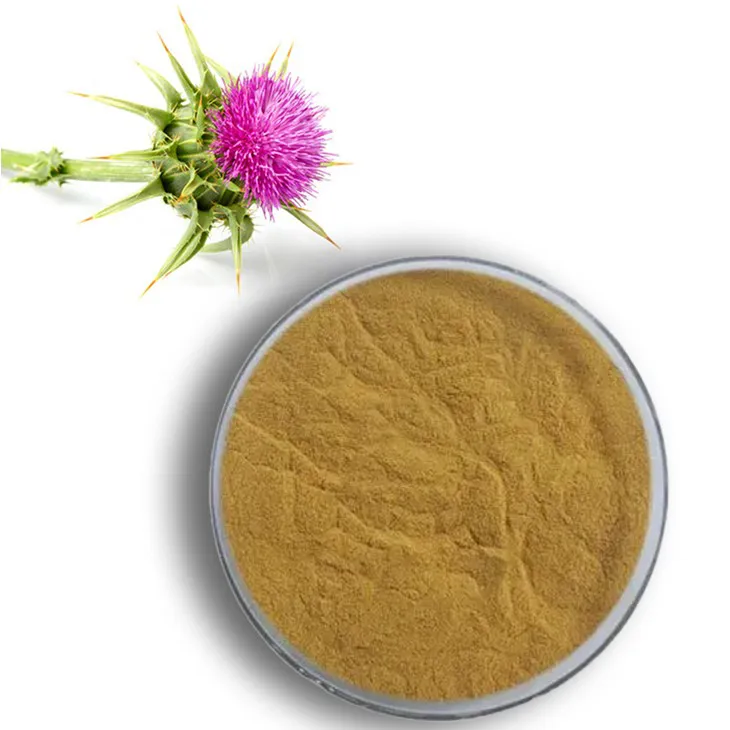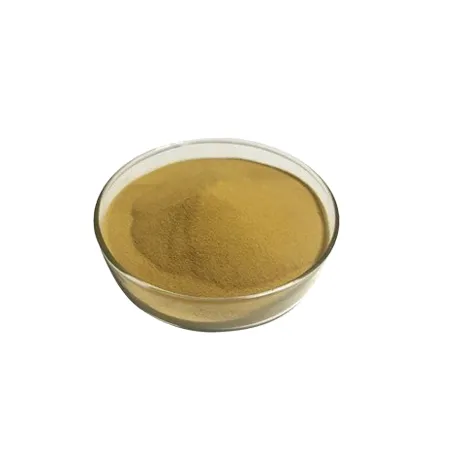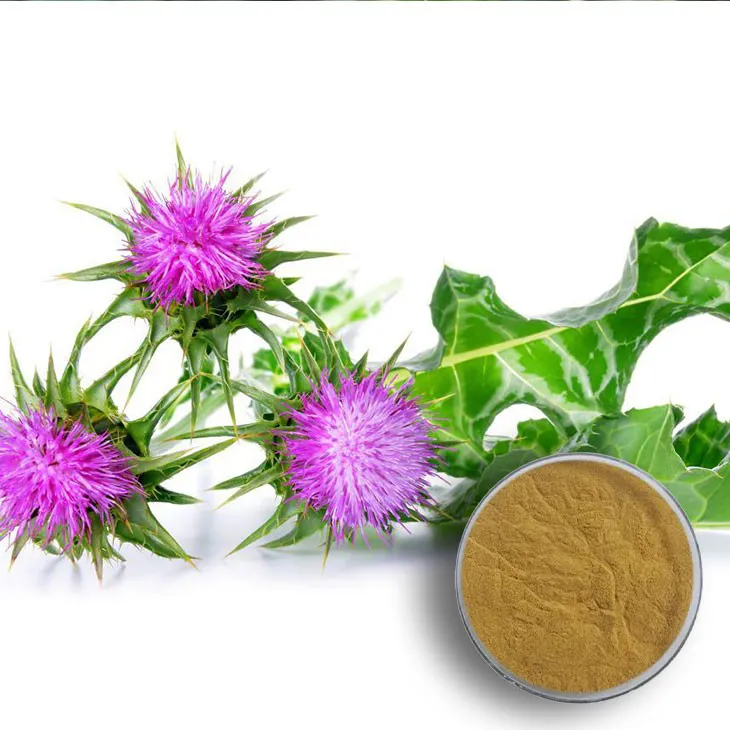- 0086-571-85302990
- sales@greenskybio.com
4 Things Consumers and Manufacturers Should Know about Milk Thistle Extract
2024-12-17

Introduction
Water Silybum marianum extract, more commonly known as Milk Thistle Extract, has emerged as a significant element in various sectors. This extract has drawn the attention of both consumers and manufacturers due to its potential applications and benefits. In this article, we will explore four important aspects that both consumers and manufacturers should be aware of regarding Milk Thistle Extract.

1. For Consumers: Potential Health Benefits
a. Liver - Protecting Properties
Milk Thistle Extract has been extensively studied for its liver - protecting capabilities. The liver is a vital organ in the body, responsible for numerous functions such as detoxification, metabolism of nutrients, and production of bile. Milk thistle extract may play a crucial role in helping the liver to detoxify. It contains a compound called silymarin, which is believed to have antioxidant and anti - inflammatory effects on the liver cells. These properties can help protect the liver from damage caused by toxins, such as alcohol, drugs, and environmental pollutants. Additionally, milk thistle extract has been shown to promote liver cell regeneration. This means that in cases where the liver has been damaged, the extract may assist in the repair and growth of new liver cells, potentially improving liver function over time.
b. Awareness of Appropriate Dosage
Another important factor for consumers to consider is the appropriate dosage of milk thistle extract. Taking the correct dosage is essential to achieve the desired health benefits. If the dosage is too low, it may not be effective in providing the intended liver - protecting or other potential benefits. On the other hand, taking too much of the extract can also be a problem. Excessive intake may lead to unwanted side effects, although these are relatively rare. Different products may recommend different dosages depending on factors such as the concentration of the extract and the form in which it is sold (e.g., capsules, tinctures). It is advisable for consumers to consult a healthcare professional or follow the instructions provided on the product label carefully.

2. For Manufacturers: Quality Control
a. Ensuring Purity
Manufacturers of milk thistle extract must place a high emphasis on quality control, especially when it comes to ensuring the purity of the extract. Purity refers to the absence of contaminants or impurities in the extract. These could include substances such as pesticides, heavy metals, or other unwanted plant materials. To ensure purity, manufacturers need to source high - quality raw materials. This often involves carefully selecting suppliers who can provide Silybum marianum plants that have been grown in a clean and controlled environment. Additionally, during the extraction process, strict manufacturing processes should be followed to remove any potential impurities. Advanced purification techniques may be employed to achieve a high - level of purity in the final extract.
b. Maintaining Potency
Alongside purity, maintaining the potency of milk thistle extract is also crucial for manufacturers. Potency relates to the strength or effectiveness of the active compounds in the extract, particularly silymarin. The potency of the extract can be affected by various factors during the manufacturing process. For example, improper extraction methods may result in a lower concentration of silymarin in the final product. Manufacturers need to optimize their extraction processes to ensure that the maximum amount of active compounds is retained in the extract. This may involve using the right solvents, extraction temperatures, and extraction times. Regular testing of the extract's potency is also necessary to ensure that each batch meets the required standards. By maintaining the potency of the extract, manufacturers can provide consumers with a product that is more likely to deliver the expected health benefits.
c. Complying with Regulations
Manufacturers are also required to comply with relevant regulations to guarantee product safety. There are often strict regulations governing the production, labeling, and marketing of dietary supplements, including milk thistle extract. These regulations are in place to protect consumers from potential harm and ensure that products are accurately represented. For example, regulations may specify the maximum allowable levels of certain contaminants in the extract, or require specific information to be included on the product label, such as the ingredients list, dosage instructions, and any potential side effects. Manufacturers need to stay up - to - date with these regulations and ensure that their production processes and product labeling are in full compliance. Failure to comply with regulations can result in legal consequences and damage to the company's reputation.

3. For Both: Understanding Different Forms of the Extract
a. Capsules
One of the common forms in which milk thistle extract is available is in the form of capsules. Capsules offer several advantages for both consumers and manufacturers. For consumers, they are a convenient way to take the extract. Capsules are easy to swallow and can be taken with water, making it simple to incorporate the supplement into a daily routine. From a manufacturing perspective, capsules can be easily mass - produced and have a relatively long shelf - life. However, the absorption rate of the extract from capsules may be affected by factors such as the type of capsule shell used and the formulation of the extract inside the capsule. Some capsules may be designed to have a slow - release mechanism, which can affect how quickly the active compounds are absorbed into the body.
b. Tinctures
Tinctures are another form of milk thistle extract. A tincture is a liquid extract that is usually made by soaking the Silybum marianum plant in a solvent, such as alcohol or glycerin. Tinctures have a different absorption rate compared to capsules. The liquid form of tinctures may be absorbed more quickly in the body, as it does not need to be broken down in the same way as a capsule. For some consumers, tinctures may be a preferred option if they want a faster - acting supplement. However, tinctures may have a stronger taste due to the presence of the solvent, which can be a drawback for some people. Manufacturers need to consider these factors when producing tinctures, such as choosing the right solvent to balance taste and effectiveness, and ensuring proper packaging to prevent evaporation or degradation of the tincture.
Conclusion
In conclusion, milk thistle extract is a product with significant potential in the health and supplement industries. Consumers should be well - informed about its potential health benefits and the importance of taking the appropriate dosage. Manufacturers, on the other hand, have a responsibility to ensure quality control, including purity, potency, and compliance with regulations. Understanding the different forms of the extract, such as capsules and tinctures, is also important for both parties. By being aware of these four aspects, both consumers and manufacturers can make more informed decisions regarding milk thistle extract, leading to a safer and more effective use of this valuable natural extract.
FAQ:
Q1: What are the main health benefits of milk thistle extract for consumers?
For consumers, milk thistle extract has been studied for its liver - protecting properties. It may help in detoxifying the liver and promoting liver cell regeneration.
Q2: How important is the appropriate dosage for consumers when taking milk thistle extract?
The appropriate dosage is very crucial for consumers. Taking too much or too little of milk thistle extract may not yield the desired results.
Q3: What is the most important factor for manufacturers regarding milk thistle extract?
For manufacturers, quality control is of utmost importance when dealing with milk thistle extract. They need to ensure the purity and potency of the extract.
Q4: Why should manufacturers comply with relevant regulations for milk thistle extract products?
Manufacturers should comply with relevant regulations to guarantee the safety of milk thistle extract products.
Q5: What should both consumers and manufacturers know about the forms of milk thistle extract?
Both consumers and manufacturers should understand the different forms of the extract, such as capsules or tinctures, and their respective absorption rates.
Related literature
- The Health Benefits of Milk Thistle Extract: A Comprehensive Review"
- "Milk Thistle Extract: Quality Control and Regulation in the Manufacturing Process"
- "Understanding Different Forms of Milk Thistle Extract and Their Efficacy"
- ▶ Hesperidin
- ▶ citrus bioflavonoids
- ▶ plant extract
- ▶ lycopene
- ▶ Diosmin
- ▶ Grape seed extract
- ▶ Sea buckthorn Juice Powder
- ▶ Beetroot powder
- ▶ Hops Extract
- ▶ Artichoke Extract
- ▶ Reishi mushroom extract
- ▶ Astaxanthin
- ▶ Green Tea Extract
- ▶ Curcumin Extract
- ▶ Horse Chestnut Extract
- ▶ Other Problems
- ▶ Boswellia Serrata Extract
- ▶ Resveratrol Extract
- ▶ Marigold Extract
- ▶ Grape Leaf Extract
- ▶ blog3
- ▶ blog4
- ▶ blog5
-
Fig Extract
2024-12-17
-
Polygonum Cuspidatum Extract
2024-12-17
-
Purple Sweet Potato Extract
2024-12-17
-
Okra Extract
2024-12-17
-
Coconut Water Powder
2024-12-17
-
Propolis Extract Powder
2024-12-17
-
Panax Ginseng Leaf Extract
2024-12-17
-
Hedyotis Diffusa Extract
2024-12-17
-
Stevia Extract
2024-12-17
-
Pine bark Extract Powder
2024-12-17





















